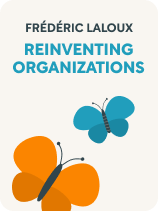

This article is an excerpt from the Shortform book guide to "Reinventing Organizations" by Frédéric Laloux. Shortform has the world's best summaries and analyses of books you should be reading.
Like this article? Sign up for a free trial here.
Does your organization treat employees as adults or children? Do people feel as though they can be themselves at work?
In Reinventing Organizations, business consultant Frédéric Laloux identifies many commonalities among the companies included in his research. These include encouraging all employees to be their authentic selves at work.
Continue reading to learn the difference that authenticity at work can make.
Authenticity at Work
Laloux claims that visionary organizations put a priority on enabling their workers to grow into their own potential. Visionary companies are places where employees find a safe space to show up as themselves, be treated as adults, and flourish in an environment of healthy collaboration.
(Shortform note: In The Power of Now, Eckhart Tolle argues that we must be fully present with others (putting aside the mask of our ego) in order to truly connect with and relate to the people around us. Tolle asserts, and Laloux would agree, that engaging as our whole, authentic selves not only benefits us but is necessary for the world’s well-being.)
Laloux points out that, in modern organizations, everyone is forced to close off part of themselves in order to present a mask of professionalism. Managers treat employees as parents would a child. On the other hand, companies with visionary cultures promote authenticity at work, encouraging people to be fully present, quirks and all. With no hierarchy, colleagues relate to each other as adults and are able to see each other as people, not merely cogs in a machine.
(Shortform note: In Built to Last, Collins and Porras take a different view. The companies in their study benefit from hiring people who are already in alignment with the company’s culture and indoctrinating them to feel like members of an exclusive group. Collins and Porras argue that assimilating workers into a culture—rather than accepting their authentic selves—allows a company to trust them with autonomy while upholding the organization’s values.)
Without having to impress a boss every day, workers are more likely to simply be themselves. But, in order for people to bring their whole selves, the company must be a safe space to do so. Laloux shows that visionary companies accomplish this by training everyone in leadership skills such as listening, coaching, gratitude, and authenticity.
(Shortform note: Encouraging colleagues to open up about themselves requires the courage to set aside the management/employee power dynamic, but it can reap great benefits. In Dare to Lead, Brené Brown gives the example of Air Force colonel Dede Halfhill, whose honest conversations with her airmen about their emotions successfully stemmed a drop in performance by revealing their feelings of exhaustion and loneliness.)
Visionary organizations also create avenues for personal development by allowing for learning and growth at company meetings, onboarding sessions, and in the workplace. (Shortform note: Because everyone in a visionary organization is expected to take on some leadership responsibility, the learning curve may be steep. In The First 90 Days, Michael Watkins lays out even more areas of training than Laloux mentions, including the company’s history, its present composition, and where it’s currently heading.)

———End of Preview———
Like what you just read? Read the rest of the world's best book summary and analysis of Frédéric Laloux's "Reinventing Organizations" at Shortform.
Here's what you'll find in our full Reinventing Organizations summary:
- The practices and values that are inherent in the next level of human organization
- A look at the paradigm shifts in organizational structure over the past 10,000 years
- How to implement visionary practices at your company






